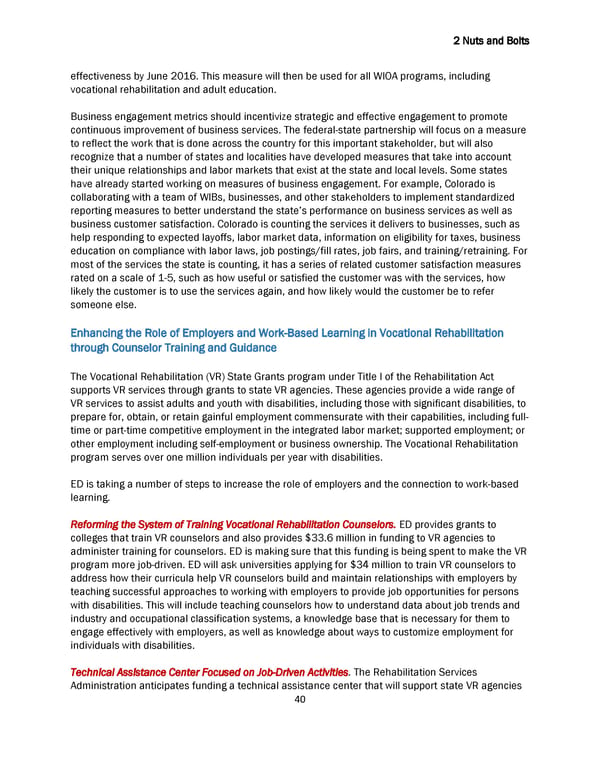2 Nuts and Bolts effectiveness by June 2016. This measure will then be used for all WIOA programs, including vocational rehabilitation and adult education. Business engagement metrics should incentivize strategic and effective engagement to promote continuous improvement of business services. The federal-state partnership will focus on a measure to reflect the work that is done across the country for this important stakeholder, but will also recognize that a number of states and localities have developed measures that take into account their unique relationships and labor markets that exist at the state and local levels. Some states have already started working on measures of business engagement. For example, Colorado is collaborating with a team of WIBs, businesses, and other stakeholders to implement standardized reporting measures to better understand the state’s performance on business services as well as business customer satisfaction. Colorado is counting the services it delivers to businesses, such as help responding to expected layoffs, labor market data, information on eligibility for taxes, business education on compliance with labor laws, job postings/fill rates, job fairs, and training/retraining. For most of the services the state is counting, it has a series of related customer satisfaction measures rated on a scale of 1-5, such as how useful or satisfied the customer was with the services, how likely the customer is to use the services again, and how likely would the customer be to refer someone else. Enhancing the Role of Employers and Work-Based Learning in Vocational Rehabilitation through Counselor Training and Guidance The Vocational Rehabilitation (VR) State Grants program under Title I of the Rehabilitation Act supports VR services through grants to state VR agencies. These agencies provide a wide range of VR services to assist adults and youth with disabilities, including those with significant disabilities, to prepare for, obtain, or retain gainful employment commensurate with their capabilities, including full- time or part-time competitive employment in the integrated labor market; supported employment; or other employment including self-employment or business ownership. The Vocational Rehabilitation program serves over one million individuals per year with disabilities. ED is taking a number of steps to increase the role of employers and the connection to work-based learning. Reforming the System of Training Vocational Rehabilitation Counselors. ED provides grants to colleges that train VR counselors and also provides $33.6 million in funding to VR agencies to administer training for counselors. ED is making sure that this funding is being spent to make the VR program more job-driven. ED will ask universities applying for $34 million to train VR counselors to address how their curricula help VR counselors build and maintain relationships with employers by teaching successful approaches to working with employers to provide job opportunities for persons with disabilities. This will include teaching counselors how to understand data about job trends and industry and occupational classification systems, a knowledge base that is necessary for them to engage effectively with employers, as well as knowledge about ways to customize employment for individuals with disabilities. Technical Assistance Center Focused on Job-Driven Activities. The Rehabilitation Services Administration anticipates funding a technical assistance center that will support state VR agencies 40
 Biden Ready to Work White Paper 7/22/14 Page 39 Page 41
Biden Ready to Work White Paper 7/22/14 Page 39 Page 41